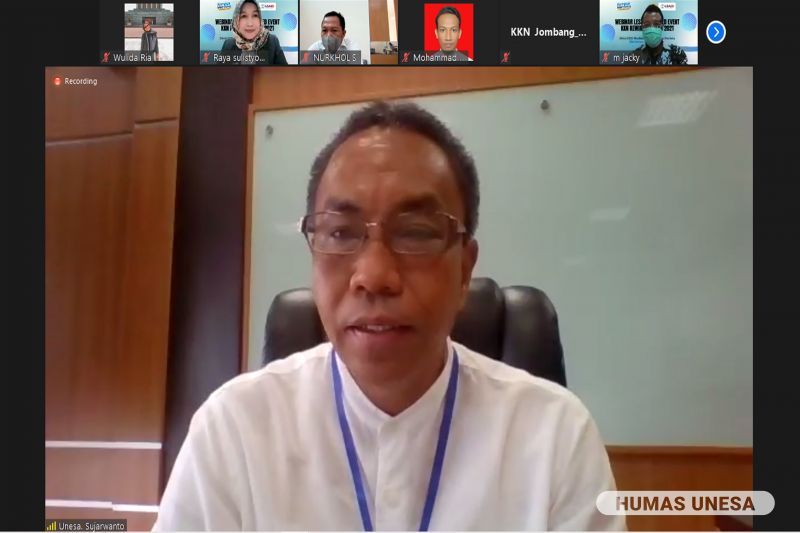
www.unesa.ac.id
Unesa.ac.id, Surabaya-The State University of Surabaya held a Lesson Learned Event of Entrepreneurship Thematic Real Work Lecture (KKN TKWU) on Monday (31/5/2021). The virtual activity was attended by Prof. dr. Aris Junaidi, Ph.D Director of Learning and Student Affairs, Kemendikbudristek RI and Deputy Chancellor for Planning and Cooperation at Unesa Dr. Sujarwanto, M.Pd. In addition, the representative of USAID Mitra Kunci, Ester Manurung, was also attended.
This activity is intended to measure the success and evaluate the implementation of the 2021 TKWU KKN Unesa. In his remarks, Sujarwanto said that the policy of 'free learning on an independent campus' provided an opportunity for students to hone their soft skills and hard skills. Through the TKWU KKN program, students can develop these two skills together with the community. What has been learned in the classroom so far is implemented in the field.
Universities in the future, added Sujarwanto, will face new job opportunities due to automation. There will be 23 million old jobs lost and about 27 to 46 million new jobs replaced. That way, students need to be more dynamic, and increase innovation in learning wherever they are.
According to him, KKN and MBKM intend to encourage students to be ready to face the challenges and demands of the future. By doing community service, students are challenged and trained to have a sensitivity to see problems in the community, and are also required to solve these problems innovatively based on their respective fields of knowledge.
“Students can do village service and build villages for 6-12 months with village officials, BUMDes, cooperatives, or other organizations by applying the knowledge gained on campus. That way, students can understand problems in the field, be productive, and have a high social spirit, think freely, are able to solve problems, are able to communicate, and think critically," he said.
On that occasion, Aris Junaidi appreciated the TKWU KKN program organized by Unesa, which was supported by USAID Mitra Kunci. According to him, the program can ignite the spirit of collaboration between students and the community which in the end can realize innovation and achievement. On the one hand, students with their spirit and innovation can help the community and answer economic problems and the welfare of the people in the villages.
While on the other hand, it can mature students in honing their competencies and sharpening their skills. "I believe that the MKBM and KKN TKWU Unesa programs can encourage the creation of advanced village communities and excellent students," he said firmly.
Dr. Muhammad Sholeh, M.Pd Head of the Unesa MBKM Unit said that the Unesa MBKM program has been quite helpful and able to move the community's economy from traditional patterns to digital-based approaches and patterns. Moreover, this year's Unesa TKWU KKN, the themes and programs that are carried out are really based on community problems and help the community answer these problems.
He proposed an example, one of which was the Unesa TKWU KKN group in Jombang which held entrepreneurship training activities for children with disabilities at the Kembang Mekar Foundation, Jombang, East Java. The KKN group trains children with special needs to make salted eggs and choco crumbs. "This is very interesting and inspiring, children with disabilities are considered unable to do anything, but through the special touch of KKN students, these children can be invited to make something and be creative," he said. "In this context, it is clear that the role of students can help the community to increase its potential and develop it towards further and advanced stages," he continued.
Then Dr. Nurkholis, M.Pd, Head of the KKN Division of the Unesa MBKM Unit also said that the entrepreneurship theme KKN was a strategic program and would be one of Unesa's KKN flagship programs. The program, he added, became a great potential for the development of entrepreneurship for students and the community. In addition, it is also very supportive of Unesa towards a Legal Entity State University (PTN BH).
He added, the economic aspect of society is currently experiencing a massive shift. Retail which initially dominated and now one by one closed its outlets. That means, the economic sector is quite dynamic. Campuses need to take a role through their TKWU KKN program to move the economy of the community in the village with a touch of modern digital-based approaches and strategies. "For digital matters, our students are the experts, and they are the ones who have the potential to reach that direction," he explained.
At the end of the session, Ahmad Sobirin as the Secretary of Masangan Village said that the 2021 TKWU KKN was very beneficial for the community, especially in Masangan Village. According to him, as long as Unesa KKN students in their village make a lot of positive contributions and contributions to the community.
He added that his village has advantages in agriculture, such as kale, mustard greens, spinach, and many more. Unesa KKN students help watering vegetables using technology (Sprinkle) so that people no longer need to water vegetables manually.
In addition, during the month of Ramadan, Unesa TKWU KKN students collaborated with Karang Taruna to organize a Ramadan festival by making sales stands that had never been done before. With this idea, the community in Masangan village can be helped in selling and can improve the community's economy.
"We village officials feel happy and appreciate the Unesa student program in our village, they can provide many things and they can also learn a lot about our village, our community and learn to communicate and socialize well," he said. "Thank you for your contribution, and hopefully this program can be continued in the future," he hoped. (Wulida/zam)
Share It On:






